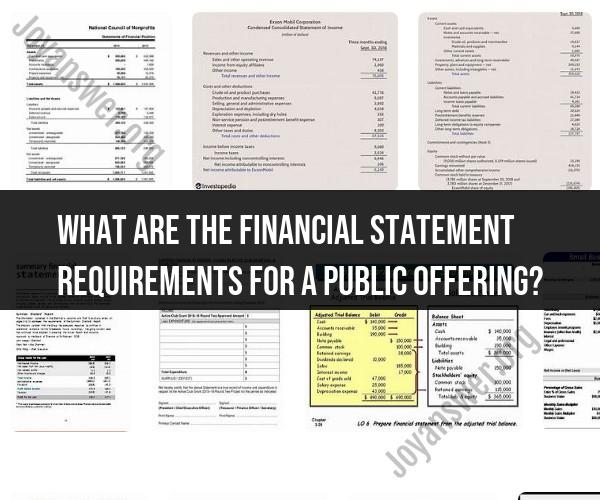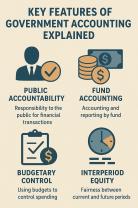What are the financial statement requirements for a public offering?
The financial statement requirements for a public offering, also known as an initial public offering (IPO), are governed by regulatory authorities in the country where the offering takes place. In the United States, for example, the Securities and Exchange Commission (SEC) establishes specific financial reporting requirements for companies conducting IPOs. Here are the key financial statement requirements for a public offering in the U.S., although similar regulations exist in other countries:
Registration Statement (Form S-1 or Form F-1): The company planning the IPO must file a registration statement with the SEC, typically on Form S-1 (for U.S. domestic issuers) or Form F-1 (for foreign private issuers). This document serves as a comprehensive disclosure of the company's financial and business information. The financial statements included in the registration statement must conform to generally accepted accounting principles (GAAP) in the U.S.
Audited Financial Statements: The financial statements included in the registration statement must be audited by an independent registered public accounting firm. The audit must be conducted in accordance with auditing standards established by the Public Company Accounting Oversight Board (PCAOB).
Historical Financial Statements: The registration statement must include historical financial statements for a specified number of years, typically three years for large accelerated filers, two years for smaller reporting companies, and one year for emerging growth companies. These financial statements consist of:
- Balance Sheets: Providing a snapshot of the company's financial position at the end of each fiscal year.
- Income Statements: Detailing the company's revenue, expenses, and net income or loss for each fiscal year.
- Cash Flow Statements: Presenting the company's cash flows from operating, investing, and financing activities for each fiscal year.
- Statements of Changes in Shareholders' Equity: Demonstrating changes in shareholders' equity over each fiscal year.
Pro Forma Financial Statements: Pro forma financial statements may be required to reflect the impact of significant events, such as acquisitions or divestitures, that occurred or are expected to occur after the most recent fiscal year-end.
Management's Discussion and Analysis (MD&A): The registration statement must include an MD&A section, where the company's management discusses its financial condition, results of operations, and liquidity. This section provides context and insights into the financial statements.
Selected Financial Data: A summary of selected financial data, including key financial metrics, for the past five years is typically included in the registration statement.
Independent Auditor's Report: The auditor who conducted the audit of the financial statements provides an independent auditor's report on the financial statements, expressing their opinion on whether the financial statements are presented fairly in accordance with GAAP.
Required Disclosures: The registration statement must also include various disclosures about the company's business, risk factors, executive compensation, related-party transactions, and other relevant information.
Interim Financial Statements: If the IPO registration statement is filed at a date significantly before the end of the fiscal year, interim financial statements may be required, typically covering the most recent interim period.
It's important to note that the specific financial reporting requirements may vary based on the size of the company, its industry, and the regulatory authority's rules. Companies going public should work closely with legal and financial advisors to ensure compliance with all applicable regulations and to prepare the required financial disclosures accurately.
Financial Reporting for a Public Offering: Requirements and Essentials
When a company goes public, it is required to file a registration statement with the Securities and Exchange Commission (SEC). This registration statement must include a variety of financial information, including:
- Audited financial statements for the past three fiscal years
- Unaudited financial statements for the current fiscal year up to the date of the registration statement
- A management discussion and analysis (MD&A)
- A pro forma financial statement if the company has recently acquired or disposed of a significant business unit
The financial statements included in the registration statement must be prepared in accordance with the generally accepted accounting principles (GAAP) in the United States. The MD&A must discuss the company's financial condition and results of operations, as well as any known trends or uncertainties that could affect the company's future financial performance.
Navigating Regulatory Demands in Public Offering Financial Statements
The SEC has a number of specific requirements for the financial statements that are included in public offering registration statements. These requirements are designed to ensure that the financial statements are accurate and complete, and that they provide investors with the information they need to make informed investment decisions.
Some of the key SEC requirements for public offering financial statements include:
- The financial statements must be audited by an independent auditor.
- The financial statements must be prepared in accordance with GAAP.
- The financial statements must be accompanied by an MD&A that discusses the company's financial condition and results of operations, as well as any known trends or uncertainties that could affect the company's future financial performance.
- The financial statements must be presented in a clear and concise manner, and they must be easy for investors to understand.
Ensuring Compliance and Transparency in Public Offering Statements
It is important for companies to ensure that their public offering financial statements are in full compliance with all applicable SEC requirements. Failure to comply with these requirements could result in delays or even denials of the company's registration statement.
Companies can help to ensure compliance by working with experienced accountants and lawyers who are familiar with the SEC's public offering financial statement requirements. Companies should also carefully review their financial statements before filing their registration statement with the SEC.
Conclusion
Financial reporting for a public offering is a complex and demanding process. However, it is an essential step for companies that want to raise capital from the public. By following the SEC's requirements and working with experienced professionals, companies can ensure that their public offering financial statements are accurate, complete, and in compliance with all applicable regulations.












